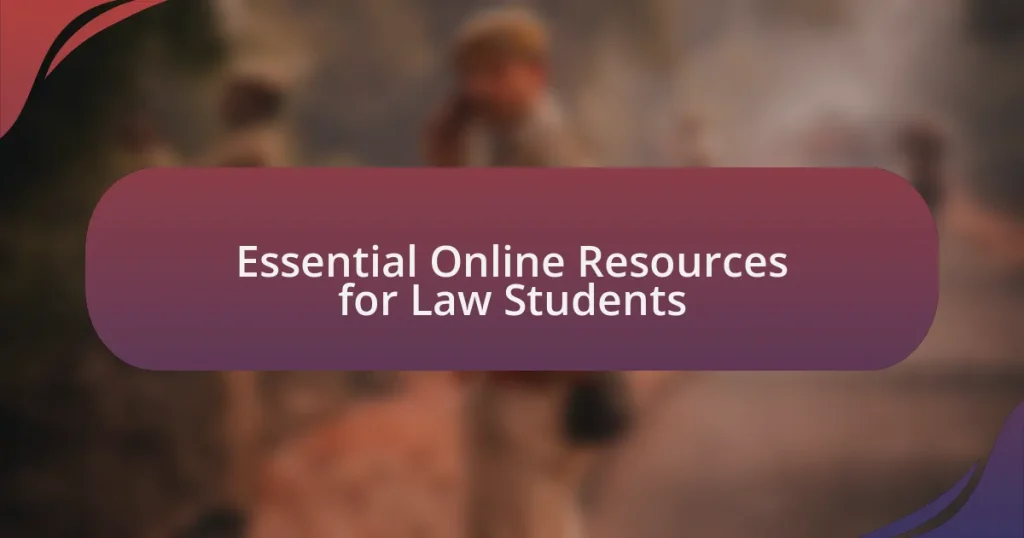Essential online resources for law students encompass legal research databases, online legal libraries, and educational platforms. Key resources include Westlaw and LexisNexis for comprehensive access to case law and statutes, Google Scholar for free legal documents, and platforms like Coursera and edX for accredited law courses. The article highlights the importance of these resources in enhancing research capabilities, facilitating collaboration, and providing up-to-date legal information. It also discusses strategies for effective utilization, evaluation of credibility, and the role of online resources in complementing traditional legal education and exam preparation.

What are Essential Online Resources for Law Students?
Essential online resources for law students include legal research databases, online legal libraries, and educational platforms. Legal research databases such as Westlaw and LexisNexis provide access to case law, statutes, and legal journals, which are crucial for comprehensive legal research. Online legal libraries like Google Scholar and the Legal Information Institute offer free access to a wide range of legal documents and scholarly articles. Educational platforms such as Coursera and edX provide law courses from accredited institutions, enhancing students’ understanding of various legal topics. These resources are vital for academic success and practical application in the legal field.
Why are online resources important for law students?
Online resources are important for law students because they provide immediate access to a vast array of legal information, case law, and scholarly articles. This accessibility enhances research capabilities, allowing students to stay updated on current legal trends and precedents. For instance, platforms like Westlaw and LexisNexis offer comprehensive databases that include millions of legal documents, which are essential for thorough legal analysis and understanding. Additionally, online resources facilitate collaboration and communication among students and faculty, fostering a more interactive learning environment.
How do online resources enhance legal education?
Online resources enhance legal education by providing accessible, diverse, and up-to-date information that supports learning and research. These resources include online databases, legal research platforms, and educational websites that offer case law, statutes, and legal commentary. For instance, platforms like Westlaw and LexisNexis allow students to conduct comprehensive legal research efficiently, which is crucial for understanding complex legal concepts. Additionally, online courses and webinars from institutions such as Harvard and Yale offer flexible learning opportunities, enabling students to learn from experts in the field regardless of their geographical location. This accessibility to a wealth of information and expert knowledge significantly enriches the educational experience for law students.
What challenges do law students face without online resources?
Law students face significant challenges without online resources, including limited access to legal databases, reduced research efficiency, and inadequate exposure to current legal developments. The absence of online legal databases, such as Westlaw or LexisNexis, restricts students’ ability to conduct comprehensive legal research, which is essential for understanding case law and statutes. Furthermore, without online resources, students may struggle to find relevant academic articles and legal journals, leading to a lack of depth in their understanding of complex legal issues. Additionally, the inability to access real-time updates on legal changes and trends can hinder their preparedness for practical legal work, as staying informed is crucial in the rapidly evolving legal landscape.
What types of online resources are available for law students?
Law students have access to various online resources, including legal research databases, online course platforms, legal blogs, and forums. Legal research databases such as Westlaw and LexisNexis provide comprehensive access to case law, statutes, and legal journals, essential for academic and practical applications. Online course platforms like Coursera and edX offer courses on legal topics, enhancing knowledge and skills. Legal blogs, such as Above the Law, provide insights into current legal issues and trends, while forums like Reddit’s r/LawSchool allow students to discuss experiences and seek advice from peers. These resources collectively support law students in their studies and professional development.
What are the key categories of online resources?
The key categories of online resources for law students include legal research databases, educational platforms, legal blogs and forums, government websites, and online libraries. Legal research databases, such as Westlaw and LexisNexis, provide access to case law, statutes, and legal journals, essential for comprehensive legal research. Educational platforms like Coursera and edX offer courses on various legal topics, enhancing knowledge and skills. Legal blogs and forums, such as Above the Law, facilitate discussions and insights from legal professionals. Government websites provide official legal information and resources, while online libraries, like Google Scholar, offer access to academic articles and legal publications. These categories collectively support law students in their academic and professional pursuits.
How do different types of resources serve various legal topics?
Different types of resources serve various legal topics by providing specialized information tailored to specific areas of law. For instance, case law databases like Westlaw and LexisNexis offer access to judicial opinions, which are crucial for understanding legal precedents in litigation. Statutory databases provide access to legislative texts, essential for interpreting statutory law. Legal research guides and textbooks serve as foundational resources for students, offering comprehensive overviews of legal principles and theories. Additionally, online legal journals and articles provide current analyses and discussions on emerging legal issues, enhancing students’ understanding of contemporary legal debates. Each resource type fulfills a distinct role, ensuring that law students can effectively navigate the complexities of different legal topics.

How can law students effectively utilize online resources?
Law students can effectively utilize online resources by leveraging legal databases, online libraries, and educational platforms to access case law, statutes, and legal research materials. For instance, platforms like Westlaw and LexisNexis provide comprehensive databases that include primary and secondary legal sources, which are essential for thorough legal research. Additionally, law students can use resources such as Google Scholar for accessing academic articles and legal opinions, enhancing their understanding of complex legal issues. Furthermore, online courses and webinars offered by institutions like Coursera and edX can supplement their education with specialized knowledge and skills relevant to their studies. These resources collectively support law students in developing their research capabilities and staying updated with current legal trends.
What strategies can law students employ to maximize their use of online resources?
Law students can maximize their use of online resources by employing targeted search techniques, utilizing legal databases effectively, and engaging with online legal communities. Targeted search techniques involve using specific keywords and Boolean operators to refine search results in databases like Westlaw and LexisNexis, which contain extensive legal materials. Effective utilization of legal databases includes familiarizing oneself with advanced search features, filters, and citation tools to streamline research processes. Engaging with online legal communities, such as forums and social media groups, allows students to exchange knowledge, seek advice, and stay updated on legal trends and resources. These strategies enhance research efficiency and improve access to relevant legal information.
How can students evaluate the credibility of online legal resources?
Students can evaluate the credibility of online legal resources by assessing the authority, accuracy, objectivity, and currency of the information provided. Authority can be determined by checking the qualifications and expertise of the authors or organizations behind the resource, such as law schools, government agencies, or recognized legal professionals. Accuracy involves verifying the information against reputable sources, ensuring it is supported by evidence and free from errors. Objectivity requires analyzing the resource for bias, ensuring that it presents information fairly and without undue influence from external interests. Lastly, currency is important; students should check the publication date to ensure the information is up-to-date and relevant to current legal standards. These criteria help ensure that the resources used are reliable and trustworthy for legal research.
What tools can assist in organizing and accessing online resources?
Tools that can assist in organizing and accessing online resources include reference management software, cloud storage services, and note-taking applications. Reference management software like Zotero and EndNote helps users collect, organize, and cite research materials efficiently. Cloud storage services such as Google Drive and Dropbox enable users to store and share documents securely, facilitating easy access from multiple devices. Note-taking applications like Evernote and Microsoft OneNote allow users to capture and organize information systematically, enhancing retrieval and study efficiency. These tools are widely used in academic settings, providing essential support for law students in managing their resources effectively.
What are the best practices for integrating online resources into legal studies?
The best practices for integrating online resources into legal studies include evaluating the credibility of sources, utilizing reputable legal databases, and incorporating multimedia resources for diverse learning. Credibility can be assessed by checking the author’s qualifications, the publication’s reputation, and the currency of the information. Reputable legal databases, such as Westlaw and LexisNexis, provide access to primary and secondary legal materials, ensuring that students engage with authoritative content. Additionally, incorporating multimedia resources, such as online lectures and interactive case studies, enhances understanding and retention of complex legal concepts. These practices are supported by research indicating that diverse learning methods improve comprehension and application of legal principles.
How can online resources complement traditional legal education?
Online resources can complement traditional legal education by providing access to a vast array of materials, including case law databases, legal research tools, and interactive learning platforms. These resources enhance understanding by allowing students to engage with real-world legal scenarios and access up-to-date information that may not be covered in textbooks. For instance, platforms like Westlaw and LexisNexis offer comprehensive legal databases that enable students to conduct thorough research and stay informed about recent legal developments. Additionally, online courses and webinars from reputable institutions can supplement classroom learning by offering specialized knowledge and insights from experienced practitioners. This integration of online resources fosters a more dynamic and flexible learning environment, ultimately preparing students for the demands of the legal profession.
What role do online resources play in exam preparation?
Online resources play a crucial role in exam preparation by providing accessible study materials, practice exams, and interactive learning tools. These resources enhance understanding of complex legal concepts and improve retention through varied formats such as videos, quizzes, and articles. For instance, platforms like Quizlet and Khan Academy offer tailored content that aligns with law curricula, allowing students to engage with the material actively. Research indicates that students who utilize online resources tend to perform better academically, as they can study at their own pace and revisit challenging topics as needed.

What specific online resources should law students consider?
Law students should consider specific online resources such as Westlaw, LexisNexis, and Bloomberg Law for legal research. These platforms provide comprehensive databases of case law, statutes, and legal journals, essential for academic and practical applications. Westlaw offers advanced search features and access to a vast library of legal documents, while LexisNexis is known for its extensive news coverage and legal analytics. Bloomberg Law integrates business and legal information, making it valuable for understanding the intersection of law and commerce. These resources are widely recognized in legal education and practice, ensuring that law students have access to reliable and authoritative information.
What are the top websites and databases for legal research?
The top websites and databases for legal research include Westlaw, LexisNexis, and Bloomberg Law. Westlaw provides comprehensive legal research tools, including case law, statutes, and secondary sources, widely used by legal professionals. LexisNexis offers extensive legal databases and news sources, making it a staple for legal research. Bloomberg Law combines legal research with business intelligence, providing unique insights into legal trends and practices. These platforms are recognized for their reliability and depth of information, essential for effective legal research.
How do subscription-based services compare to free resources?
Subscription-based services offer more comprehensive and reliable resources compared to free resources. While free resources may provide basic information, subscription services typically include access to extensive databases, peer-reviewed journals, and specialized legal research tools that enhance the quality of research for law students. For instance, platforms like Westlaw and LexisNexis offer curated content and advanced search functionalities that are not available in free resources, ensuring that users can find accurate and relevant legal information efficiently. Additionally, a study by the American Association of Law Libraries found that 85% of law students reported improved research outcomes when using subscription-based services, highlighting their effectiveness in legal education.
What are the advantages of using legal blogs and forums?
Legal blogs and forums provide valuable advantages for law students, including access to diverse perspectives and real-time updates on legal issues. These platforms facilitate engagement with legal professionals and peers, enhancing understanding of complex topics through discussions and shared experiences. Additionally, legal blogs often feature expert insights and analyses, which can supplement academic learning and provide practical knowledge. The interactive nature of forums allows for questions and clarifications, fostering a collaborative learning environment. Overall, these resources are essential for staying informed and connected within the legal community.
How can law students find and access relevant online legal materials?
Law students can find and access relevant online legal materials through various reputable legal research databases and platforms. Key resources include Westlaw, LexisNexis, and Google Scholar, which provide access to case law, statutes, legal journals, and secondary sources. Additionally, many law schools offer subscriptions to these databases, allowing students to utilize them for free. According to a 2021 survey by the American Association of Law Libraries, 85% of law libraries provide access to online legal research tools, ensuring that students have the necessary resources for their studies.
What search techniques can improve resource discovery?
Utilizing advanced search techniques such as Boolean operators, keyword variations, and filters can significantly enhance resource discovery. Boolean operators like AND, OR, and NOT refine search results by combining or excluding terms, thus narrowing down relevant resources. For instance, using “law AND ethics” retrieves documents that contain both terms, while “law NOT ethics” excludes those that mention ethics. Additionally, employing keyword variations, including synonyms and related terms, broadens the search scope, capturing diverse resources. Filters, such as date ranges, document types, and subject categories, allow users to specify their search parameters, leading to more targeted results. Research indicates that these techniques can improve search efficiency and accuracy, making it easier for law students to find pertinent legal materials.
How can students stay updated on new online resources?
Students can stay updated on new online resources by subscribing to academic newsletters, following relevant social media accounts, and utilizing online platforms that aggregate educational content. Academic newsletters often provide curated information about new resources, tools, and research relevant to law students. Social media accounts of legal organizations and educational institutions frequently share updates on new online resources. Additionally, platforms like ResearchGate and Google Scholar alert users to new publications and resources in their fields of interest, ensuring that students have access to the latest information.
What tips can help law students navigate online resources effectively?
Law students can navigate online resources effectively by utilizing advanced search techniques, organizing their research, and critically evaluating sources. Advanced search techniques, such as using Boolean operators and specific keywords, enhance the precision of search results in legal databases like Westlaw and LexisNexis. Organizing research through tools like citation managers helps maintain clarity and efficiency in tracking sources. Additionally, critically evaluating sources for credibility, relevance, and authority ensures that students rely on accurate and trustworthy information, which is essential in legal studies.



